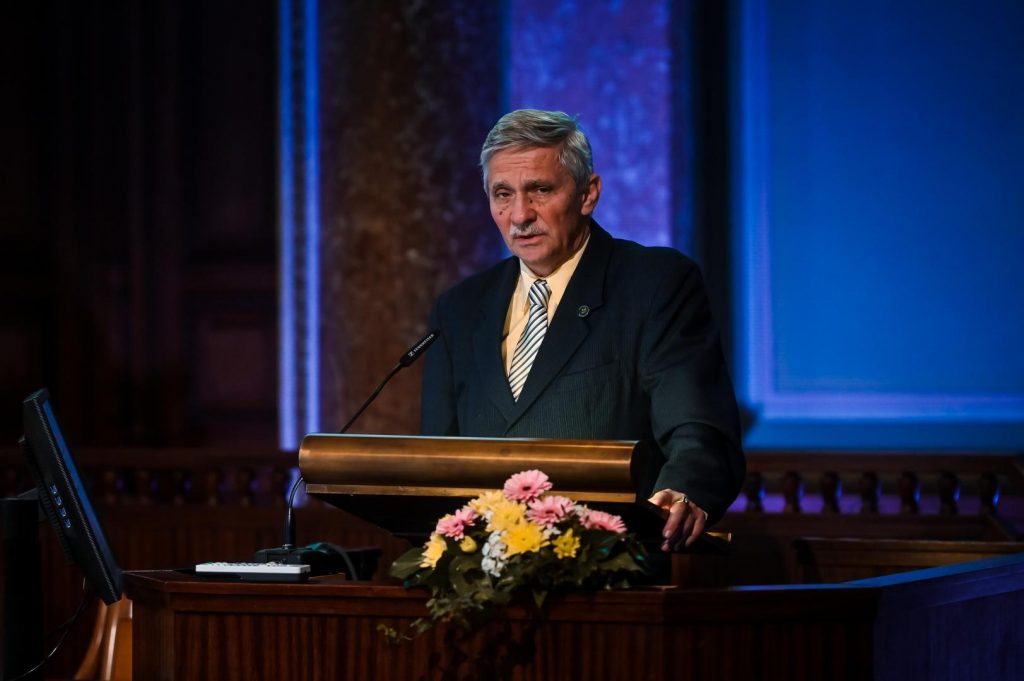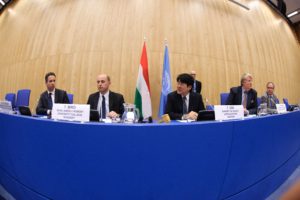Climate change influences every aspect of our lives. To the extent that, in March 2021 NATO Secretary General Jens Stoltenberg said that the military must be at the forefront of tackling climate change. Is it really the task of the armed forces in the 21st century to combat the effects of global warming? We interviewed Major General József Padányi, Professor at the HHK, Head of the Military Engineering Doctoral School, author of the recently published book “Challenges, Risks, Responses. The Challenges of Climate Change and their Impact on Military Forces”
How is the military affected by climate change?
Both the consequences of climate change and the growing number of disasters have a serious effect on the daily life of the military. If we look at the statistics published by the World Meteorological Organisation over the last fifty years, we can see that the number of natural disasters is slowly but surely increasing, and one of the causes is clearly climate change. Natural disasters will become more frequent in the future, but the ability to prevent them and to deal with the consequences is scarce, so it is almost inevitable to use military force for these tasks. And if it is used, it means that, while the force is defending against floods, dealing with snow and rescuing people, it cannot do the job it is meant to do, defending the country. All in all, climate change has a very serious impact on training, tools, equipment, motivation, thinking, and the military cannot hide from it, and it doesn’t want to.
In the meanwhile, the operation of the armed forces also has a carbon footprint, a pollution factor…
Yes, in another aspect, military force itself is an emitter. Technical equipment pollutes the environment, so the military must also think about how to reduce emissions without decreasing efficiency, for example by maintaining the combat capability and destructive power of the equipment. Fortunately, there are alternative solutions, but, I stress, the most important is the basic purpose: the effectiveness of military force. However, the same approach applies to base operations, so methods and solutions that can reduce the carbon footprint must be prioritised. For example, greening, insulation, proper heating systems, efficient electricity systems and, last but not least, landscaping. The implementation of smart cities includes the replacement of lighting fixtures, the purchase of lower consumption but efficient devices, the reduction of paved surfaces to increase infiltration and drainage, the collection of rainwater and municipal water, recycling, and so on. In this respect, a military base is equivalent to a city, so we have to apply the same methodology, on condition that the security of the military facility is not compromised.

You mentioned the issue of water. How is the scarcity of a natural resource due to global warming transformed to a military conflict?
Climate change has made the natural environment in many parts of our planet uninhabitable. A classic example is the Sahel, where hundreds of thousands of people migrate because of dwindling drinking water, but there is nowhere to go because wherever they could go, there are others already living there. Situations like this generate a lot of conflict, even within a country, which can lead to violence, and a country may not be able to deal with it on its own. In such cases, the international community provides assistance, one of the means of which may be the use of military force to restore order and the functioning of the state. Tasks such as these become increasingly frequent and place an extra burden on the military. We talked about Africa, but the role of drinking water as a key element of human life cannot be emphasised enough globally. Unfortunately, there are regions in the world where the situation is already tragic and we have virtually no solution for the local people. In addition to the problem of too little water, the problem of too much water is also present, because rainfall events are becoming more frequent and more intense. So we need to pay more and more attention to adaptability, because if we can’t change something, we have to try to adapt to it.
What do we Hungarians have to adapt to?
Climate change affects every minute of our lives. Adverse extremities in temperature and precipitation, which are unexpected, pose serious health risks, not only for us humans, but also for flora and fauna, and therefore also affect the daily life of agriculture. The Carpathian Basin’s position is not as good as we think. On the one hand, warming pushes climatic boundaries northwards, so the agricultural practices that have been ingrained in us over hundreds of years will not be usable, efficient or sustainable. On the other hand, its geographical position makes Hungary rather vulnerable. Both the Bős-Nagymaros project on the Danube and the cyanide pollution of the Tisza showed their exposure and vulnerability, which means that if these large bodies of water are diverted, blocked, polluted or interfered with in any way, either accidentally or maliciously, the consequences will be very serious for Hungary. However, this is not unprecedented in the world. We could give you examples from North, Central and South America, but there’s the Nile, the Tigris and the Euphrates, there’s China, Nepal, Turkey…
How does NATO respond to global warming?
In March 2021, NATO Secretary General Jens Stoltenberg said that NATO, as a recognised and respected international organisation, must take the lead in tackling climate change. He did not urge NATO to solve all the problems, but to be at the forefront of research and, development and keeping the issue on the table. It must set an example and inspire all those who are open to this issue. If NATO is able to demonstrate good practice, methodologies and technique, then good practice can be an example for all.
What additional burden does this place on our country as a NATO member?
So-called multi-purposing does not mean that the military force has to be able to perform completely different things, as they are often similar tasks. A helicopter pilot flies a helicopter in war, and also when he carries sandbags to a flood protection dyke. The circumstances are different, but the helicopter has to be flown. A diver dives in war, a diver dives during flood protection, a technical soldier performs technical tasks in a different environment. Multi-purposing does not necessarily mean different tasks, but it forces us to be prepared to perform a task that requires our expertise in other circumstances. Therefore, multi-purpose training will be prioritised in the training of existing human resources. So if I have ten soldiers, and I can’t increase their headcount, I have to train those ten soldiers to be able to carry out their basic tasks, to defend the homeland, but at the same time to be able to deal with various crisis situations in peacetime. Whether it’s a snow emergency, floods or any natural disaster. This approach also fits in with the Zrínyi Defence and Military Development Programme, and the monograph published here is intended to support the programme.
What can assist the army, the military sciences, in this mission?
Over the past ten to fifteen years, it became clear that individual sciences are less able to innovate, and cooperation with other disciplines became essential. Interdisciplinarity or multidisciplinarity, is no longer avoidable for any discipline. Here at the university, cooperation between the faculties and cooperation between the different doctoral schools was also established on climate change. Obviously, everyone is knowledgeable in their own field, everyone wears their own glasses, but I am happy to use the methods used by my colleagues in my own research, and I am happy to publish my results myself. So, to give you a concrete example: in a flood situation, without the training and knowledge of water management professionals, the National Defence Forces or other agencies are involved in vain; and, in our cooperation with the Faculty of Water Sciences, we can also help to shape attitudes, for example in the course I teach on the role and possibilities for the police and the National Defence Forces in flood protection. In other words, we are doomed to cooperate.
What do we, as civilians, have to do if we want to take our part?
Everyone has a task. I ask my students how they shave, how they wash up? In running water? You don’t, do you? But these are small things. However, if they become part of our daily routine, if they integrate with our thoughts, then we can move forward. Let me give you a recent example. Now, when the knife is at our neck, metaphorically speaking, to save gas and electricity, we were and we are able to do it. Let’s not get to the point where we are taken to the cleaners on water because, let’s face it, we don’t spare on water. So let’s think that the knife is already in our backs and do what we have to do! Everybody in their own role.




